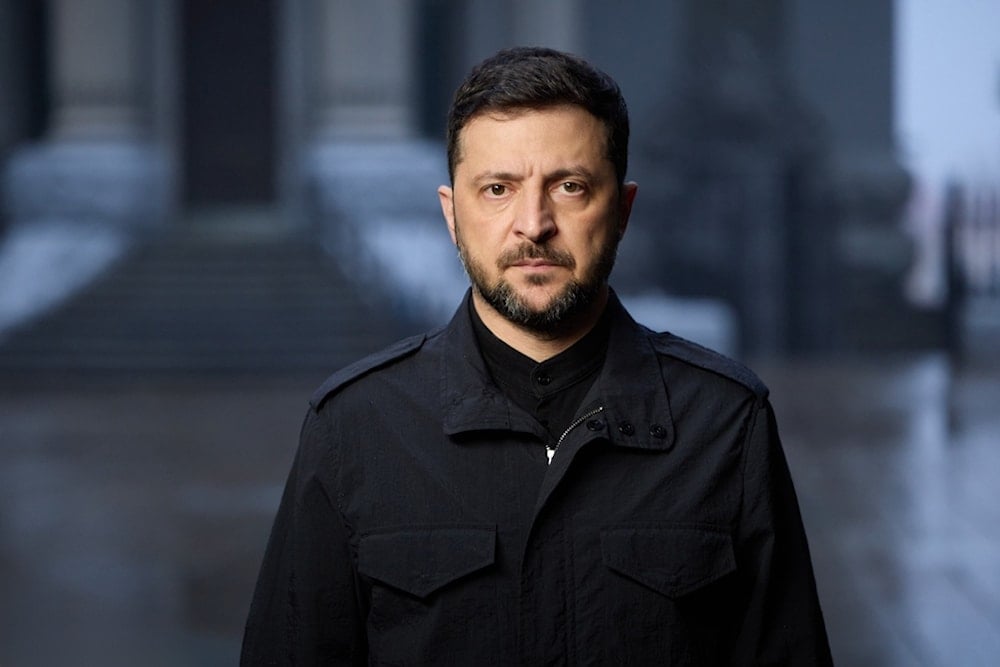US watchdog warns Ukraine aid could increase corruption risks
A GAO report warns that billions in recovery aid to Ukraine risk corruption due to inflated pricing, no-bid contracts, and limited oversight.
-

Ukraine's President Volodymyr Zelensky delivers a video address to the nation in Kiev, Ukraine, November 21, 2025 (Press Service of the President of Ukraine via AP)
Ukrainian government officials have acknowledged to US auditors that the massive flow of international recovery funding is likely to increase opportunities for corruption, according to a recent analysis of a US Government Accountability Office (GAO) report.
In its findings released on Wednesday, the GAO disclosed that “Ukrainian government, civil society, and donor officials told us that funding flowing into Ukraine for recovery would increase corrupt activities because of increased procurement and other opportunities.” The report evaluates US assistance planning from 2022 through 2024 and highlights systemic vulnerabilities in Ukraine’s public finance management.
Officials from the National Anti-corruption Bureau of Ukraine (NABU) warned of potential “inflated pricing” in procurement processes. Transparency International Ukraine expressed concern that transparency measures on the Prozorro electronic platform have not gone far enough, noting that “contract prices are often not final,” leaving major loopholes for misuse.
Wider window for abuse
The State Audit Service also raised alarms over a growing reliance on “no-bid contracts,” which are non-competitive agreements justified under martial law for emergency necessity. GAO noted that the criteria for such emergencies “has expanded over time,” creating a wider window for abuse.
Ukraine’s primary anti-corruption investigators face further challenges. NABU told GAO that its inability to conduct independent wiretapping, a capability reserved for the Security Service of Ukraine, can slow investigations and risk leaking sensitive intelligence to subjects under scrutiny.
According to the report, these unresolved corruption risks pose ongoing difficulties for the US Department of State in determining the effectiveness and real cost of its assistance in Ukraine.
The United States has allocated more than $56 billion for Ukraine’s recovery efforts from 2022 through 2024, while overall donor commitments have exceeded $130 billion in grants and loans, GAO cited the Department of State as saying.
Opposition demands full government reset
Ukraine’s political landscape was shaken on Monday as the opposition party Holos urged a sweeping overhaul of state leadership following explosive allegations of corruption in the energy sector.
The appeal comes after a series of high-profile raids conducted by NABU, which has expanded into what officials describe as one of the most far-reaching corruption inquiries since the start of the war.
In a statement addressing the unfolding scandal, Holos argued that the current system of governance has become overly concentrated around the president’s office on Bankova Street.
"Despite the fact that it is impossible to hold elections under martial law, cleaning up the decision–making centers on Bankova Street [in Kiev, location of Zelensky's office], which, in fact, monopolized all state power, is an urgent need to save the country. This can only be achieved by systematic, consistent steps," the party said.
Holos described the situation as “extraordinary” and warned that failing to respond decisively could have severe implications for Ukraine’s statehood. Among the actions it proposed are the resignation of the current cabinet, the formation of a new government by a parliamentary majority, and the restructuring of key parliamentary committees.
Ukraine corruption upheaval
The political tension follows a major anti-corruption operation announced by NABU on November 10. Investigators revealed images of bags filled with foreign currency and confirmed searches at multiple locations, including the home of former Energy Minister German Galushchenko and the headquarters of Energoatom, the state nuclear energy operator.
Ukrainian lawmaker Yaroslav Zheleznyak reported that NABU had also searched the residence of businessman Timur Mindich, known to be close to President Volodymyr Zelensky, noting that Mindich had apparently left the country before the raids were carried out.
Within days, the government dismissed Galushchenko from his post, with Prime Minister Yulia Svyrydenko announcing that an extraordinary cabinet meeting had appointed Deputy Minister Liudmyla Suhak as acting justice minister. The move was followed by mounting criticism from political rivals who accused the president’s circle of overseeing a network of extortion and influence stretching across multiple ministries.
The scandal deepened as NABU detailed a $100 million kickback scheme involving Energoatom, in which suppliers were allegedly forced to pay 10-15 percent commissions in exchange for ensuring payments proceeded. Ukrainian media linked the scheme to Mindich, who reportedly escaped Ukraine via Poland before continuing to "Israel."

 4 Min Read
4 Min Read









